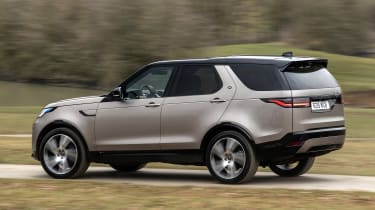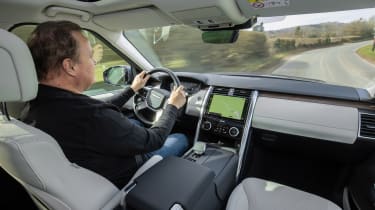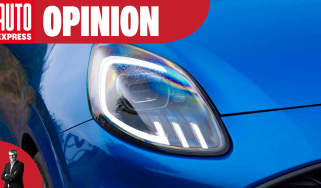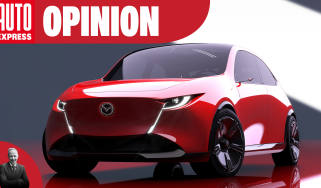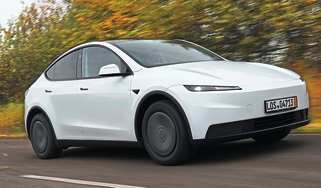New Land Rover Discovery 2021 review
A mild facelift and mild hybrid tech helps to lift the Land Rover Discovery

Verdict
The Land Rover Discovery remains our favourite seven-seat 4x4 if you do need proper space for seven people. It’s spacious, as quiet as a luxury car and now boasts one of the best infotainment systems in the business. The rest of the tech has also had a welcome boost, as have the engines with mild-hybrid help. However, the attempt to make the Disco more car-like has made the ride slightly less sumptuous than before.
It wasn’t long ago that the Land Rover Discovery was king of the hill. We named it Car of the Year back in 2017 and it has remained one of our favourite full-size, seven-seat SUVs ever since.
But then the new Land Rover Defender came along, the Discovery’s cooler, slightly cheaper (and also seven-seat) sibling. It took not only the limelight, but also sales from its bigger brother.
So now Land Rover has lavished some attention back on the Discovery, although you’d barely notice from the outside. New lights and bumpers are about the sum of it, but under the skin various chassis tweaks have supposedly made it more car-like to drive. The idea is to make it more competitive with the likes of the Volvo XC90 and Audi Q7, while moving it further from Defender.
Used - available now

2023 Land Rover
Discovery
19,282 milesAutomaticDiesel3.0L
Cash £53,750
2023 Land Rover
Discovery
19,282 milesAutomaticDiesel3.0L
Cash £53,750
2020 Land Rover
Discovery
58,220 milesAutomaticDiesel3.0L
Cash £31,500
2019 Land Rover
Discovery
37,472 milesAutomaticDiesel3.0L
Cash £32,500Although both the Discovery and Defender have seven seats, Land Rover is quick to point out that the Defender is a five-plus-two, while the Discovery is a full seven-seater. Got that?
To be fair, there is much more space in all three rows in the Disco and we’d rather seat seven in here than in any of the car’s rivals; it’s comfy wherever you sit and there’s charging power for every chair. The second row gets new seat cushions, although we wouldn’t call the old ones uncomfortable, and the middle row moves easily to make access to the third row simple.
From the driver’s seat you will notice a difference. The steering feels a tad more direct, there’s a touch less body roll through corners and the ride is a bit firmer.
While the first two we’d say are definite improvements, the super-supple, wafty nature of the Discovery has been replaced with something that’ll bounce you about a bit more. We wouldn’t go as far as saying it will make you sick, but it’s just not as comfy.
Interior improvements are a mixed bag, too. It’s a big thumbs up for the Pivi Pro infotainment system, with its beautifully crisp and responsive 11.4-inch screen that can be used with its own features, or you can fire up Apple CarPlay or Android Auto instead. It also includes software-over-the-air updates and really lifts an already premium cabin.
Did we say premium? Sadly some of the interior plastics – notably on the sizeable centre console – have been downgraded. So the rather natty small gearshifter and smaller Terrain Response controller leave more room for cheaper plastic. There’s still the same amount of cleverly thought-out storage by the driver’s elbow and elsewhere around the cabin, though.
The other big change comes under the bonnet, where mild hybrids join the range. There aren’t any plug-in hybrids – the battery might have meant no sixth and seventh seats – so this is as electrified as the new Discovery gets.
We’re driving the 296bhp D300 mild-hybrid diesel, which replaces the old V6. It’s sprightly, with 0-60mph gone in 6.5 seconds, and promises up to 33.9mpg.
You won’t really notice the hybrid assistance, which is as it’s meant to be. The small amount of electrification gives a boost at low revs and smooths out the engine’s stop-start. And if the D300 is a bit too much (and a bit too pricey), you could go for the D250 with 246bhp, or choose from a couple of petrols that are unlikely to be too popular in the UK.
Also new is the R-Dynamic trim line, which gives the Discovery a bit of sporting character. That means more black trim around the honeycomb grille (which proved rather popular with bees on our test!) dark Discovery graphics on the front and back, plus unique wheels and paint colours.
Otherwise the Discovery story is pretty much as before. Don’t tell the Defender, but the Discovery is still mightily impressive if you do want to go off road. Much of that is down to the Terrain Response system with its bespoke settings for different conditions.
You get a commanding view of the road ahead, excellent visibility all round thanks to deep glass and an array of cameras, plus there’s enough space for all the family and the dog (there are even different ‘pet packs’ you can add from the options list).
And although the prices are as lofty as the driving position, you do get a decent amount of the latest safety and luxury kit.
| Model: | Land Rover Discovery D300 R-Dynamic SE |
| Price: | £62,390 |
| Engine: | 3.0-litre six-cylinder diesel |
| Power/torque: | 296bhp/650Nm |
| Transmission: | Eight-speed automatic, four-wheel drive |
| 0-60mph: | 6.5 seconds |
| Top speed: | 130mph |
| Economy/CO2: | 33.9mpg/222g/km |
| On sale | Now |


